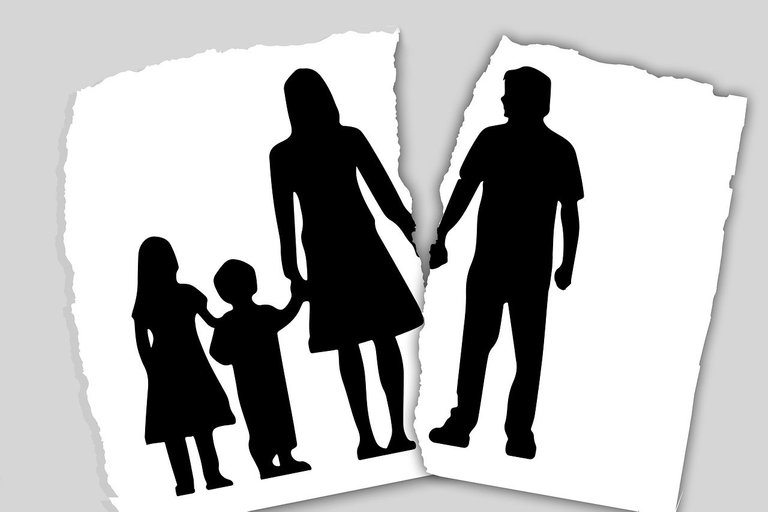Hola mis estimados amigos de Home Edders y agentes de educación. Hoy quiero compartir un tema con ustedes que quizá muchos de nosotros aprendimos cuando nos tocó pasar por esa situación y se trata de cómo explicarle a nuestros hijos la separación ya sea física definitiva de un ser amado como en el caso de la muerte, por procesos de separación de pareja o por situaciones laborales como es el caso de muchas familias que por la migración se han separado. Sin duda alguna esa experiencia puede convertirse en algo traumático sino se trata adecuadamente.
Source: pixabay.com

This post is especially about the psychological and emotional care that we must give to these situations so that they do not become events that negatively mark the lives of children and the family as a whole. Talking first of all about death is not easy, because as human beings we are clinging to life and in most people death is not something we plan, however when it happens it is a very painful situation that we adults can rarely handle without getting depressed or feeling extremely sad even when we have a full understanding of that fact that is linked to life.
Este post trata especialmente de ese cuidado psicológico y emocional que debemos prestarle a estas situaciones para que no se transformen en eventos que marquen negativamente la vida de los niños y la familia en pleno. Hablar en primer lugar de la muerte no es nada fácil, porque como seres humanos estamos aferrados a la vida y en la mayoría de las personas la muerte no es algo que planificamos, sin embargo cuando ocurre es una situación muy dolorosa que pocas veces los adultos podemos manejar sin deprimirnos o sentirnos extremadamente tristes aun cuando tenemos una total comprensión de ese hecho que está unido a la vida.
Now in the case of children we must use very well the words and the way in which we are going to transmit the message, I am of the opinion that always with the greatest clarity and without creating false expectations, because to hide the death of a loved one or to say that he/she is on a trip creating in the child the expectation of a soon return is to generate a state of anxiety and feeling of abandonment in the child that as an adult becomes problems to establish new relationships of trust and affection with other people because there is always the shadow of abandonment. Our children are capable of understanding death, I insist as long as we are able to express ourselves adequately about it. There is nothing worse than promising something that we cannot fulfill.
Ahora en el caso de los niños debemos usar muy bien las palabras y la forma en la cual vamos a transmitir el mensaje, soy de las que opinan que siempre con la mayor claridad y sin crearle falsas expectativas, debido a que ocultarle la muerte de un ser amado o decir que está de viaje creando en el niño la expectativa de un pronto regreso es generar un estado de ansiedad y sentimiento de abandono en el niño que ya de adulto se transforma en problemas para establecer nuevas relaciones de confianza y afecto con otras personas porque siempre está la sombra del abandono. Nuestros niños están en la capacidad de comprender la muerte, insisto siempre y cuando nosotros logremos expresarnos adecuadamente de ello. Nada peor que prometer algo que no podemos cumplir.
Source: pixabay.com

In the case of couple separations it is the same, although it is not a corporal disappearance, it is a change in the routine or family life, here the most important point is to make the children understand that they are not to blame for anything, we are the adults responsible for the separation processes that include them and affect their lives. In the separation of a couple the most important thing is to talk to the child that this fact is a separation of the adults and that they will always be there to provide support to the children and as I tell the parents who attend some of my talks never speak ill of the other in the presence of the children that is to create a distorted image in the child I have known cases where the only ones affected and marked by the separation are the children because of two adults who failed to understand that the child was not an instrument to cause harm or revenge on the couple and that is unfortunate.
En el caso de las separaciones de pareja es igual, aunque no se trata de una desaparición corpórea si se trata de un cambio en la rutina o la vida familiar, aquí el punto más importante es hacerle entender a los niños que ellos no tienen la culpa de nada, somos los adultos los responsables de los procesos de separación que los incluyen y afectan su vida. En la separación de pareja lo primordial es hablarle al niño de que ese hecho es una separación de los adultos y que ellos siempre va estar para brindarle el apoyo a los niños y como les digo a los papás que asisten a algunas de mis charlas nunca hablar mal del otro en presencia de los niños eso es crear una imagen distorsionada en el niño he conocido casos donde los únicos afectados y marcados por la separación son los hijos por culpa de dos adultos que no lograron entender que el niño no era un instrumento para causar daño o vengarse de la pareja y eso es lamentable.
Source: pixabay.com

Last but not least, there is the obligatory separation that many families have experienced due to migration because one or both parents leave their country of origin in search of a better economic situation that favors their family, this is one of the separations that most affects the child population in many countries, where older children are left in charge of their younger siblings and in the best of cases in the care of a relative, However, statistics show that the most common is to find young people under 15 years old who have been left alone in a house without their parents and in the care of their younger siblings and they are the ones who assume the role that their parents had before, this situation should certainly be reviewed very carefully, it is not about judging those who have done it, it is about assessing the impact that this separation will bring in the future in children and young people, in this case no matter how much we try to explain why in this case learning tells us that there are not enough reasons to leave a child alone for a while. I know of cases of children with more than five years without seeing their parents and where they express that communication with them is less and less frequent, it is here where I wonder what we are doing with the future of these children.
Finalmente, y no menos importante, se encuentra la separación obligatoria que muchos familias han experimentado a causa de la migración porque uno de los papas o ambos se van de su país de origen en búsqueda de una mejor situación económica que favorezca a su familia, esta es una de las separaciones que más afectado a la población infantil de muchos países, donde los niños con más edad se quedan a cargo de sus hermanos más pequeños y en el mejor de los casos al cuidado de algún familiar, sin embargo las estadísticas muestran que lo más común es encontrarnos a jóvenes de menos de 15 años quienes se han quedado en una casa solos sin sus padres y al cuidado de sus hermanos pequeños y son ellos quienes asumen el rol que antes tenían sus padres, esta situación sin duda debe ser revisada con mucha atención, no se trata de juzgar a quienes lo han hecho se trata de evaluar las repercusiones que esta separación traerá a futuro en los niños y jóvenes, en este caso por mucho que se trate de explicar por qué en este caso el aprendizaje nos indica que no existen las razones suficientes para dejar a un hijo un tiempo en soledad. Conozco de casos de niños con más de cinco años sin ver a sus padres y donde expresan que la comunicación con ellos es cada vez menos frecuente, es aquí donde me pregunto que estamos haciendo con el futuro de estos niños.
Thank you for reading my post which is a reflection of those situations that mark our lives since childhood, I hope it is useful because everything in life is undoubtedly a learning process.
Gracias por leer mi post este que es una reflexión de esas situaciones que marcan nuestras vidas desde la niñez, espero les sea de utilidad porque todo en la vida es sin duda alguna un aprendizaje.
It is very difficult to explain the separations or learn from them as you rightly mention even adults find it very difficult but I guess it has to do with the fact that just as children we were never oriented about it. Thank you for this thoughtful post